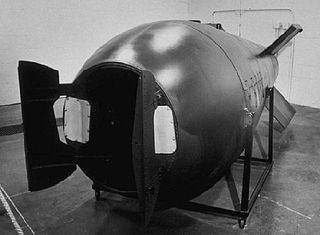- Mark 5 nuclear bomb
-
The Mark 5 nuclear bomb and W5 nuclear warhead were a common core nuclear weapon design, designed in the early 1950s and which saw service from 1952 to 1963.
The Mark 5 design was the first production American nuclear weapon which was significantly smaller than the 60 inch (150 cm) diameter implosion system of the Fat Man nuclear bomb design first used in 1945, down to 39 inches (99.1 cm) diameter. The Mark 5 design used a 92-point implosion system (see Nuclear weapon design) and a composite Uranium/Plutonium fissile material core or pit.
The Mark 5 core and W5 warhead were 39 inches (99.1 cm) in diameter and 76 inches (193 cm) long; the total Mark 5 bomb was 44 inches (111.8 cm) diameter and 129 to 132 inches (327.7 cm to 335.3 cm) long. The different versions of Mark 5 weighed 3,025 to 3,175 pounds (1372.1 kg to 1440.2 kg); the W5 versions weighed 2,405 to 2,650 pounds (1090.9 to 1202.0 kg).
The Mark 5 and W5 were a pure fission weapon. There were at least four basic models of core design used, and sub-variants with yields of 6, 16, 55, 60, 100, and 120 kilotons have been reported.
As with many early US nuclear weapon designs, the fissile material or pit could be kept separately from the bomb and assembled into it prior to flight. This technology is known as In Flight Insertion or IFI. The Mark 5 had an automatic IFI mechanism which could insert the pit into the center of the explosive assembly from a storage position in the bomb nose. The image here shows the doors to that nose compartment open.
The Mark 5 was in service from 1952 to 1963. The W5 saw service from 1954 to 1963. Approximately 72 Mark 5 weapons were carried by RAF bombers but under US control, under the auspices of Project E.[1]
References
See also
External links
- Allbombs.html list of all US nuclear warheads at nuclearweaponarchive.org
Categories:- Cold War nuclear bombs of the United States
Wikimedia Foundation. 2010.

